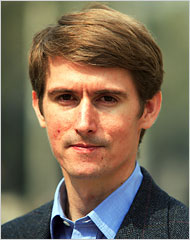
Wiith Hooker working at the source of the problem—in the part of China called chemical country, home to countless unregulated makers of drug ingredients—Bogdanich traveled to Panama, where a tainted cough-syrup ingredient made resulted in a mass poisoning and 350 deaths; to the free-trade zone of Dubai, where products made in China are repackaged or relabeled to erase their provenance; and to Milan, where he found 82 unlicensed Chinese chemical companies, several of them charged with counterfeiting, marketing their services at the biggest annual trade show for makers of pharma ingredients. Journalist Jake Hooker was a volunteer in the Peace Corps in China starting in 2000 teaching English at a middle school in Wanxian, a small town along the middle reach of the Yangtze River, near the Three Gorges.
China RPCV Jake Hooker wins Pulitzer Prize for series "A Toxic Pipeline," which tracked how dangerous and poisonous pharmaceutical ingredients from China have flowed into the global market
Times’ Drug-Supply Snoops Bag a Pulitzer
Posted on April 9th, 2008 by Walter Armstrong ·
New York TimesThe New York Times likes to give the drug industry a hard time with its (unbranded) scandal of the week series—off-label promoting, suppressing data, that sort of thing. But when the 2008 Pulitzer Prizes were handed out on Monday, the winner for best investigative reporting was a series by the Times that even its harshest pharma critics have to appreciate.
Called “The Toxic Pipeline,” the series is a truly groundbreaking investigation into the counterfeit, adulterated, and dangerous drugs that are made in China and sold to an unsuspecting world. Reporters Walt Bogdanich and Jake Hooker spent the better part of the past year tracking the drug industry’s global supply chain across four continents to locate its faulty links where no regulation of corrupt officials facilitate a crisis level of contamination.
Wiith Hooker working at the source of the problem—in the part of China called chemical country, home to countless unregulated makers of drug ingredients—Bogdanich traveled to Panama, where a tainted cough-syrup ingredient made resulted in a mass poisoning and 350 deaths; to the free-trade zone of Dubai, where products made in China are repackaged or relabeled to erase their provenance; and to Milan, where he found 82 unlicensed Chinese chemical companies, several of them charged with counterfeiting, marketing their services at the biggest annual trade show for makers of pharma ingredients.
Right in the middle of the series, FDA announced that Baxter International’s heparin was killing people—and the Times team was all over the story. With Hooker already deep in chemical country, they were able to track the supply chain back from the Shanghai factory to the tiny village suppliers who process the pig intestines, painting an unforgettable picture of this anything-goes economy with which Big Pharma does more and more business. They dropped a bombshell or two, such as getting the response of China’s FDA: Not our problem.
They also revealed how our own FDA’s investigation into the mess was foundering because—contrary to the agency’s sunny public reassurances that China was cooperating fully—it could not gain, or would not demand, access to the same upstream supply chain that the Times had already covered.
The reporters even beat FDA in IDing the actual contaminant: a molecule apparently manipulated to look and act like heparin, the result apparently of a highly sophisticated—and intentional—adulteration that could easily deceive Baxter’s controls. FDA scrambled to make the same announcement hours after the Times story broke.
Just yesterday, the agency announced that there have been five times as many heparin-related deaths (103) than it had previously reported.
For drugmakers and consumers alike, it’s hard to know which of the series’ revelations is most disturbing: that Chinese drug counterfeiters have achieved such a high level of technical prowess? Or that our own FDA seems to be cowed by, and almost covering up for, China? But we have The New York Times to thank for alerting us—and reminding us of the importance of good, old-fashioned journalism.
Check out the five-part series, “The Toxic Pipeline,” on the New York Times Web site.








